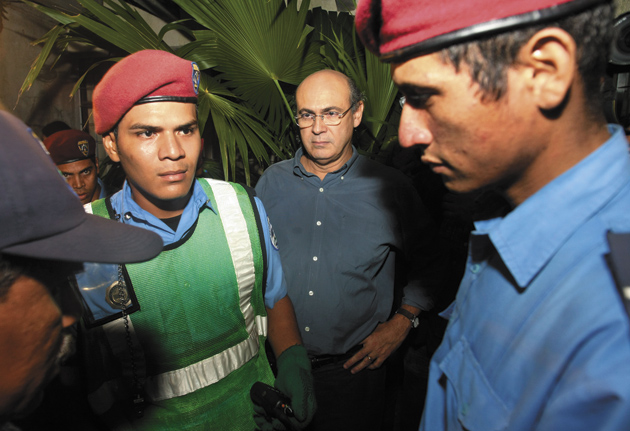
Esteban Felix/AP Images
Nicaraguan journalist Carlos Fernando Chamorro (center), a vocal critic of President Daniel Ortega and the ruling Sandinista Party, with police at the Managua offices of CINCO, the nonprofit journalism organization Chamorro directs, October 10, 2008. In a continuing crackdown against Ortega’s critics, the police returned the next day and raided CINCO’s offices on trumped-up charges of money laundering.
On October 11, 2008, a Nicaraguan federal prosecutor, Douglas Vargas, accompanied by a dozen armed
police agents, raided the Managua offices of CINCO, a nonprofit journalism organization directed by Carlos Fernando Chamorro. Police knocked down the doors while Vargas turned files upside down, claiming he was looking for evidence of money laundering. Office computers were confiscated and hauled away. In 2007, Chamorro, who is the anchor of weekly television and radio shows and edits a news magazine, exposed a multimillion-dollar extortion scheme involving the ruling Sandinista Party, and after that report, he continued to attack the government as corrupt and repressive. This did not sit well with President Daniel Ortega, who ordered the raid.
This illegal raid followed other attacks against well-known Nicaraguans who were once leading members of the Sandinista National Liberation Front and of the government that was formed after the Sandinistas’ overthrow of Anastasio Somoza in 1979. Notable among them are the priest and poet Ernesto Cardenal, eighty-three, convicted in August on a trumped-up defamation charge, and the women’s rights activist Sofía Montenegro, whose offices were raided in October after she denounced Ortega for outlawing abortion in Nicaragua. Two rival political parties have been banned, including one formed by dissident Sandinistas who accuse the Ortega government of widespread corruption and repression.
Borrowing tactics employed by Venezuelan President Hugo Chávez, who is helping to bankroll the Nicaraguan government, Ortega is using bogus lawsuits and his tightening control over the government bureaucracy to harass, marginalize, and discredit political opponents. But it is Ortega’s move against Chamorro that has elicited the most outrage from prominent journalists, writers, and intellectuals throughout Latin America. A statement signed by the writers Eduardo Galeano, Tomás Eloy Martínez, and Ariel Dorfman, among others, has called on the international community to denounce Ortega’s “dictatorial designs for Nicaragua” and to defend Chamorro, who is “standing up to the brutality of authoritarianism.” Three decades after the triumph of the Sandinista revolution, Nicaragua has once again become an ideological battleground for Latin America, this time pitting the authoritarian left against the democratic left.1
Ortega’s crackdown on Chamorro and other critics was intended to weaken the Nicaraguan civil institutions hostile to him in anticipation of the November 9 municipal elections. The strategy seems to have succeeded: on November 10, the Sandinista- appointed head of the national election commission announced that Ortega’s party was leading 102 of the 146 mayoral races across the country, including the hotly contested race in Managua, in which the election commission declared that the ruling party’s candidate, Alexis Argüello, had defeated opposition leader Eduardo Montealegre. The opposition cried foul, pointing to voter intimidation, alleged ballot stuffing, and the failure to authorize national or international election observers in an election Montealegre had been favored to win.2
Dozens were wounded in the several days of rioting that followed, including a reporter for a Sandinista radio station who was beaten and stabbed by a group of men who jumped from several cars. Sandinista supporters promised to burn down opposition newspaper and television offices in revenge, including that of the daily La Prensa, whose editor Jaime Chamorro is Carlos Fernando’s uncle. The threats were never carried out, but the country’s attorney general warned, “If Comandante Daniel Ortega decided to call [his supporters] into the street, they would take the country apart brick by brick and not one broadcaster or opposition media outlet would be left standing.”
For a generation, the Ortegas and the Chamorros have been Nicaragua’s leading political families, and their fates have been deeply intertwined. The 1978 assassination of Carlos Fernando’s father, newspaper editor Pedro Joaquín Chamorro, inspired widespread public revulsion at the Somoza regime and was a source of grievance during the San-dinistas’ rise to power. Pedro Joaquín is still listed on La Prensa ‘s masthead as a “martyr.”
For more than a decade after the triumph of Nicaragua’s Sandinista revolution, Carlos Fernando Chamorro served as editor of Barricada, the Sandinista party newspaper. After his mother Violeta Chamorro defeated Daniel Ortega in the 1990 presidential election, Carlos Fernando tried to turn Barricada into a more traditional opposition newspaper. He was forced out in a 1994 putsch led by former Sandinista Interior Minster Tomás Borge after he took a more critical position toward Ortega and his circle. Carlos Fernando later emerged as one of Nicaragua’s most respected independent journalists, and a fierce critic of the government. Among other charges, he denounced then President Arnoldo Alemán for misappropriating relief funds contributed in the aftermath of Hurricane Mitch in 1998.
Advertisement
Carlos Fernando Chamorro was tolerated as a gadfly in Nicaragua until Ortega reclaimed the presidency in his controversial election victory of 2006, in which he used a constitutional amendment and a deal with the conservative leader Alemán, who succeeded Violeta Chamorro as president from 1997 to 2002, to take office with only 38 percent of the vote. Ortega has made his disagreements with Chamorro personal, describing his former revolutionary ally as a member of the oligarchy who acts as if he were above the law. The Chamorros are of European descent and such charges are highly inflammatory in Nicaragua, where racial and class divisions linger.
In a country with a discredited and divided political opposition, weak institutions, and enfeebled civil society, Ortega has managed to accumulate vast power during only two years in office, despite his lack of support in the 2006 election and the fact that he had earlier faced criminal charges from his stepdaughter, who accused him of sexually molesting her starting when she was eleven. In order to escape prosecution, Ortega cut a political deal with former President Alemán, who had been convicted of embezzlement. Alemán was allowed to serve his sentence at home while Ortega’s Sandinistas and the ex-president’s Constitutionalist Liberal Party divided up control of state institutions, ranging from the Supreme Court to the attorney general’s office.
Chamorro’s supporters in Nicaragua and throughout Latin America believe that he is the only figure left in the country with the moral authority, the credibility, and the journalism skills to hold Ortega to account. Chamorro is counting on pressure from writers and advocacy groups in Latin America as well as the European Union, which is withholding aid from Nicaragua.
While Nicaragua’s restrictions on press freedom were a primary target of the Reagan administration’s attack on the first Ortega presidency, the US government has recently been oddly reticent. Ironically, that’s the way Chamorro prefers it: any US government statement in his favor, Chamorro says, “will only allow [Ortega] to portray himself as a victim of a conspiracy.”
But the US government has spoken out about the recent post-election violence in Managua and there is real concern that the situation could spiral out of control. Nicaragua’s feeble democratic institutions are no match for Ortega and his drive to consolidate power. If Chamorro is silenced or shoved aside, Ortega will have taken another critical step toward this goal. That would be a milestone in the rise of Latin America’s new authoritarianism, and a setback for a once promising expansion of democracy in the region.
—December 17, 2008
This Issue
January 15, 2009
-
1
In the latest development, the Nicaraguan government banned Spain’s El País newspaper from publishing an anthology of Nicaraguan poet Carlos Martínez Rivas because it included an introduction from Sergio Ramírez, Nicaragua’s best-known novelist. Ramírez was Ortega’s vice-president from 1985 to 1990, but turned against Ortega in 1995 when he founded a rival political party. The Nicaraguan government says it owns the rights to Martínez Rivas’s poems. The ban of Sergio Ramírez was presented in a letter from prominent Latin American writers, including Gabriel García Márquez and Carlos Fuentes. El País said it would not publish the collection without Ramírez’s introduction.
↩ -
2
The Sandinistas were awarded 105 of 146 mayoral races in the final tally announced on November 20.
↩



